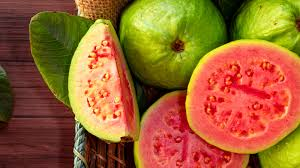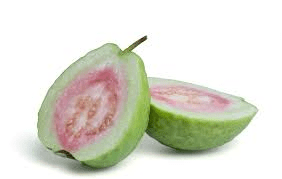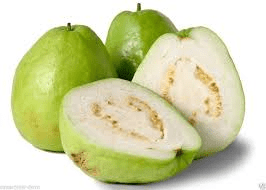Guava skin, the outer layer of the guava fruit, is a remarkable part of this tropical delight, offering numerous nutritional and health benefits. This thin, yet robust layer encases the sweet, juicy pulp of the fruit and comes in various colors, including green, yellow, and red, depending on the variety and ripeness of the guava. Its texture can range from smooth to slightly bumpy, and it is often consumed along with the flesh due to its edible nature.
One of the most striking features of guava skin is its high concentration of dietary fiber. Fiber is essential for maintaining a healthy digestive system, aiding in regular bowel movements, and preventing constipation. The skin of the guava is particularly rich in soluble fiber, which helps to slow down the absorption of sugars in the bloodstream, making it beneficial for people with diabetes or those looking to manage their blood sugar levels.
Guava skin is also a powerhouse of antioxidants, which are compounds that protect the body from damage caused by harmful molecules known as free radicals. These antioxidants include vitamin C, lycopene, and carotenoids. Vitamin C, in particular, is found in higher concentrations in the skin than in the flesh of the fruit.
It plays a crucial role in boosting the immune system, promoting skin health, and aiding in the absorption of iron from plant-based foods. Lycopene, a pigment responsible for the red and pink hues of some guava varieties, has been linked to a reduced risk of certain cancers, particularly prostate cancer. Carotenoids, another group of pigments, are known for their role in maintaining healthy vision and preventing age-related macular degeneration.
In addition to these antioxidants, guava skin contains a variety of essential minerals and vitamins. It is a good source of potassium, which is vital for heart health and the proper functioning of muscles and nerves. The skin also contains small amounts of magnesium, which is important for energy production and bone health, as well as vitamin A, which supports vision and immune function.
The antimicrobial properties of guava skin are another noteworthy aspect. Studies have shown that extracts from guava skin can inhibit the growth of harmful bacteria and fungi, making it a natural remedy for infections. These antimicrobial effects are attributed to the presence of compounds such as tannins, flavonoids, and essential oils. This makes guava skin beneficial not only for oral health, helping to prevent dental plaque and gum disease, but also for treating skin infections and promoting wound healing.
Despite its many benefits, guava skin is often overlooked and discarded. However, incorporating it into the diet can be simple and rewarding. Guava can be eaten whole, with the skin on, or the skin can be blended into smoothies, added to salads, or used in cooking and baking to enhance the nutritional content of meals. Additionally, guava skin can be dried and used to make teas or infusions, which can be a soothing and healthful beverage.
Guava skin is a nutrient-dense part of the guava fruit that offers a range of health benefits. Its high fiber content, rich supply of antioxidants, essential vitamins and minerals, and antimicrobial properties make it a valuable addition to the diet.
By consuming guava skin, individuals can support their digestive health, boost their immune system, protect against chronic diseases, and maintain overall well-being. Therefore, the next time you enjoy a guava, consider eating it with the skin to take full advantage of its remarkable health benefits.
The Economic Importance and Uses of Guava Skin

1. Nutrient-Rich Animal Feed: Guava skin can be processed into animal feed. It is rich in nutrients like vitamins and minerals, which help in the growth and health of livestock.
2. Natural Dye: Guava skin contains pigments that can be used as a natural dye for fabrics. This is a sustainable alternative to synthetic dyes.
3. Fertilizer: The composted guava skin can be used as an organic fertilizer, enriching the soil with essential nutrients and improving crop yields.
4. Biofuel Production: Guava skin can be converted into biofuel through fermentation processes, providing a renewable source of energy.
5. Cosmetic Ingredient: Guava skin is rich in antioxidants and can be used in skincare products to promote healthy skin.
6. Antimicrobial Agents: Extracts from guava skin have antimicrobial properties and can be used in natural disinfectants and preservatives.
7. Pharmaceutical Uses: Guava skin extracts are used in traditional medicine for their anti-inflammatory and analgesic properties.
8. Food Preservatives: The antimicrobial properties of guava skin make it useful as a natural preservative in the food industry.
9. Dietary Supplements: The high fiber content in guava skin makes it suitable for dietary supplements aimed at improving digestive health.
10. Livestock Bedding: Dried guava skin can be used as bedding material for livestock, providing a comfortable and absorbent layer.
11. Pectin Production: Guava skin is a source of pectin, which is used in the food industry for making jams and jellies.
12. Leather Tanning: The tannins in guava skin can be used in the leather tanning process, providing an eco-friendly alternative to synthetic tanning agents.
13. Paper Production: Guava skin fibers can be used to make paper, contributing to sustainable forestry practices.
14. Biodegradable Packaging: Guava skin can be processed into biodegradable packaging materials, reducing plastic waste.
15. Essential Oils: Essential oils extracted from guava skin can be used in aromatherapy and as natural flavoring agents.
16. Alcohol Production: Guava skin can be fermented to produce alcohol, which can be used in beverages or as an industrial solvent.
17. Mushroom Cultivation: Guava skin can be used as a substrate for growing mushrooms, providing an efficient use of agricultural waste.
18. Textile Industry: The fibers from guava skin can be blended with other materials to create sustainable textiles.
Read Also: Newcastle Disease: Symptoms and Prevention
The Products and By-products That Can Be Derived From Guava Skin

1. Pectin: Pectin is extracted from guava skin using an acid extraction process. It is used in making jams and jellies.
2. Essential Oils: Essential oils are extracted through steam distillation and are used in perfumes and aromatherapy.
3. Natural Dyes: Guava skin can be boiled to extract natural pigments for dyeing fabrics.
4. Animal Feed: Guava skin is dried and ground to produce nutrient-rich animal feed.
5. Fertilizer: Guava skin is composted to create organic fertilizer for crops.
6. Biofuel: Guava skin undergoes anaerobic digestion to produce biogas, which can be used as a renewable energy source.
7. Antimicrobial Extracts: Extracts are obtained through solvent extraction and used in natural preservatives.
8. Dietary Supplements: Guava skin is processed into powder form and used in fiber supplements.
9. Livestock Bedding: Dried guava skin is used as absorbent bedding material for livestock.
10. Leather Tanning Agents: Tannins are extracted and used in the tanning process for leather goods.
11. Paper: Guava skin fibers are processed into pulp and used in making paper.
12. Biodegradable Packaging: Guava skin is processed into biodegradable packaging materials.
13. Alcohol: Guava skin is fermented to produce alcohol for beverages or industrial use.
14. Cosmetic Ingredients: Extracts from guava skin are used in skincare products for their antioxidant properties.
15. Mushroom Substrate: Guava skin is used as a growing medium for mushrooms.
16. Textile Fibers: Fibers from guava skin are blended with other materials to create eco-friendly textiles.
17. Natural Flavorings: Essential oils from guava skin are used as natural flavoring agents in the food industry.
Read Also: Gumboro Disease: Symptoms and Prevention
Frequently Asked Questions (FAQ’s) About Guava Skin

1. What are the nutritional benefits of guava skin?
Guava skin is rich in vitamins, minerals, and antioxidants, making it beneficial for health when included in the diet.
2. Can guava skin be used in animal feed?
Yes, guava skin can be dried and processed into a nutritious feed for livestock.
3. How is guava skin used in the cosmetic industry?
Guava skin extracts are used in skincare products for their antioxidant and anti-inflammatory properties.
4. What role does guava skin play in biofuel production?
Guava skin can be fermented to produce biogas, a renewable source of energy.
5. Are there any pharmaceutical uses for guava skin?
Yes, guava skin extracts are used in traditional medicine for their analgesic and anti-inflammatory effects.
6. How is guava skin used as a natural dye?
Pigments from guava skin can be extracted and used to dye fabrics naturally.
7. Can guava skin be used to make paper?
Yes, fibers from guava skin can be processed into pulp and used in paper production.
8. What are the antimicrobial properties of guava skin?
Guava skin contains compounds with antimicrobial properties, useful in natural preservatives.
9. Is guava skin beneficial for soil?
Composted guava skin is used as an organic fertilizer, enriching the soil with nutrients.
10. How is guava skin used in alcohol production?
Guava skin can be fermented to produce alcohol, which is used in beverages or as an industrial solvent.
Read Also: How to Control Pests in the Garden

